八年级上 Module 10 Lao She’s Teahouseunit3 language in use课件
文档属性
| 名称 | 八年级上 Module 10 Lao She’s Teahouseunit3 language in use课件 | 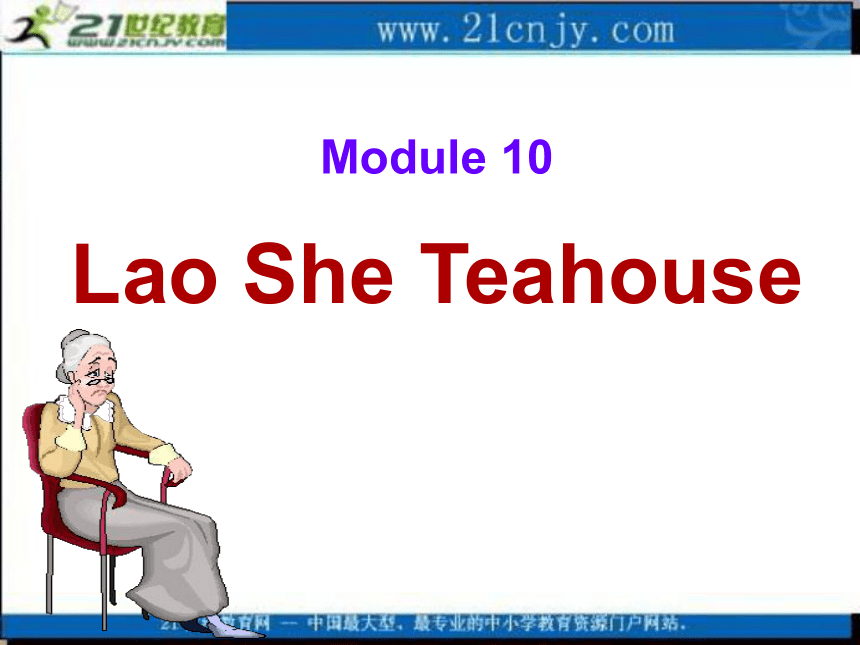 | |
| 格式 | zip | ||
| 文件大小 | 1.7MB | ||
| 资源类型 | 教案 | ||
| 版本资源 | 外研版 | ||
| 科目 | 英语 | ||
| 更新时间 | 2009-11-01 15:03:00 | ||
图片预览

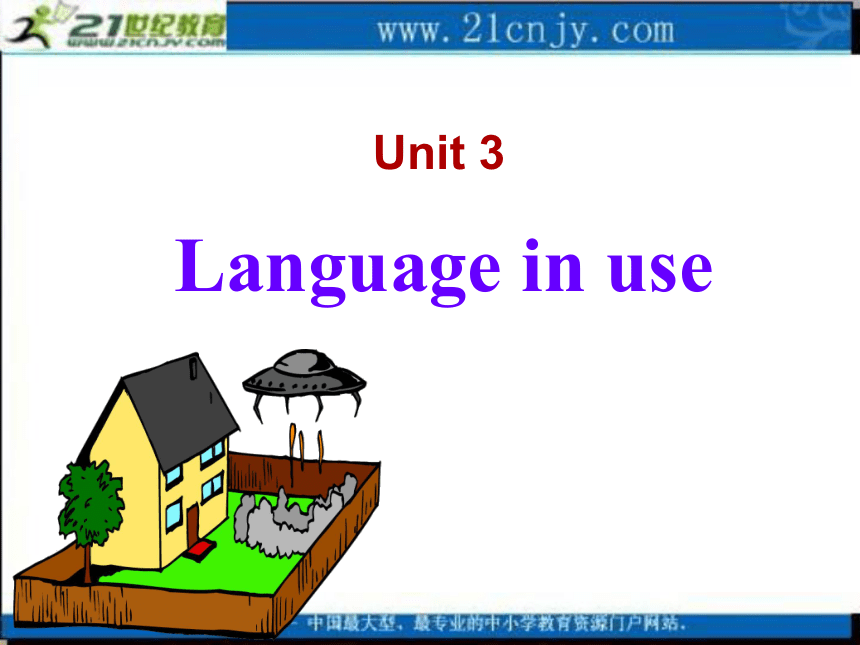
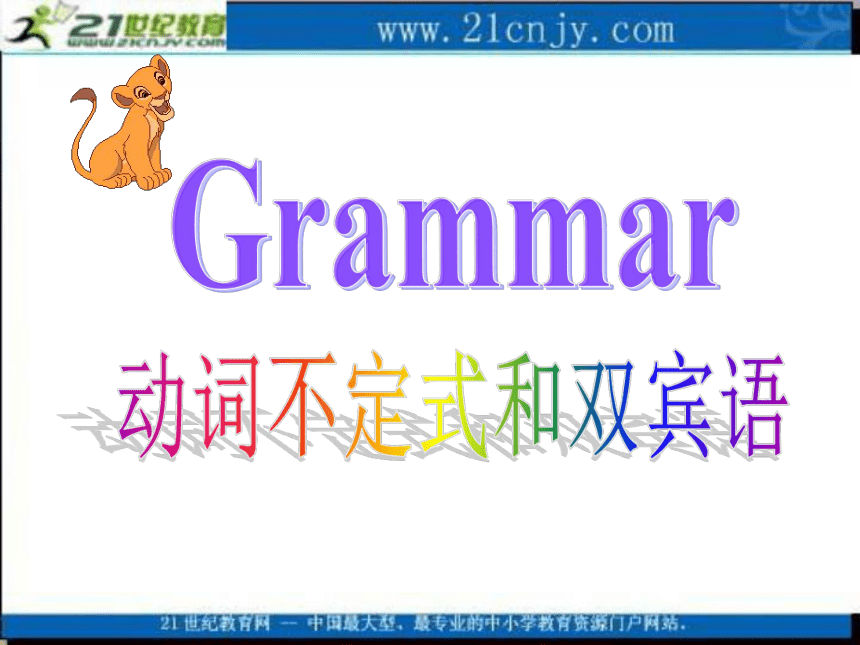
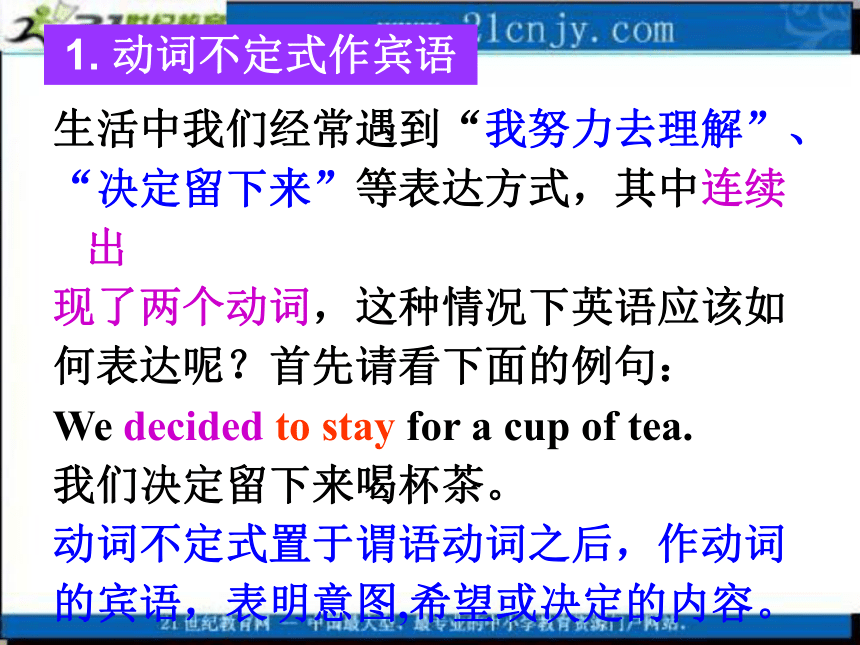
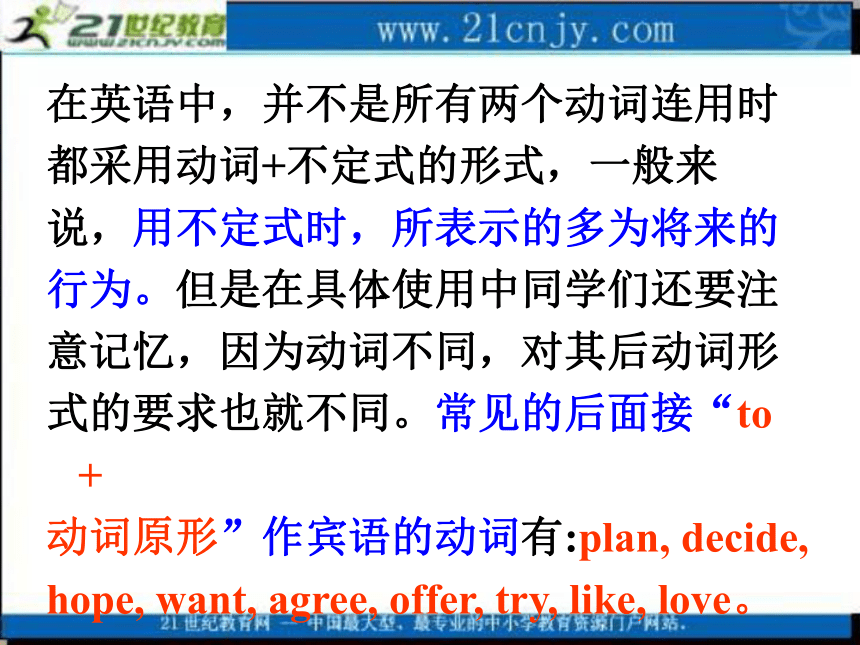
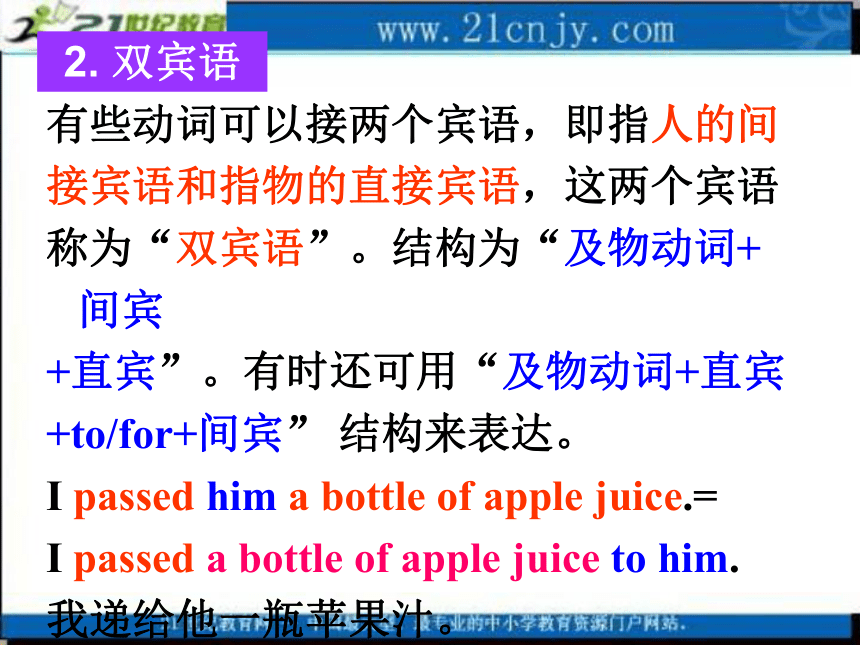
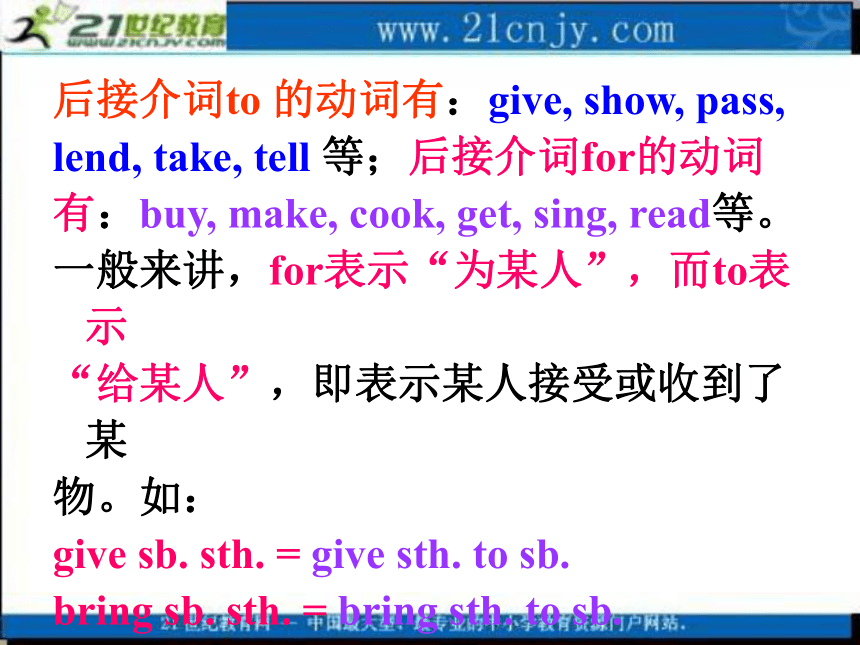
文档简介
课件19张PPT。Module 10 Lao She TeahouseLanguage in useUnit 3Grammar动词不定式和双宾语生活中我们经常遇到“我努力去理解”、
“决定留下来”等表达方式,其中连续出
现了两个动词,这种情况下英语应该如
何表达呢?首先请看下面的例句:
We decided to stay for a cup of tea.
我们决定留下来喝杯茶。
动词不定式置于谓语动词之后,作动词
的宾语,表明意图,希望或决定的内容。1. 动词不定式作宾语在英语中,并不是所有两个动词连用时
都采用动词+不定式的形式,一般来
说,用不定式时,所表示的多为将来的
行为。但是在具体使用中同学们还要注
意记忆,因为动词不同,对其后动词形
式的要求也就不同。常见的后面接“to +
动词原形”作宾语的动词有:plan, decide,
hope, want, agree, offer, try, like, love。2. 双宾语有些动词可以接两个宾语,即指人的间
接宾语和指物的直接宾语,这两个宾语
称为“双宾语”。结构为“及物动词+间宾
+直宾”。有时还可用“及物动词+直宾
+to/for+间宾” 结构来表达。
I passed him a bottle of apple juice.=
I passed a bottle of apple juice to him.
我递给他一瓶苹果汁。后接介词to 的动词有:give, show, pass,
lend, take, tell 等;后接介词for的动词
有:buy, make, cook, get, sing, read等。
一般来讲,for表示“为某人”,而to表示
“给某人”,即表示某人接受或收到了某
物。如:
give sb. sth. = give sth. to sb.
bring sb. sth. = bring sth. to sb.
lend sb. sth. = lend sth. to sb.hand sb. sth. = hand sth. to sb.
send sb. sth. = send sth. to sb.
show sb. sth. = show sth. to sb.
leave sb. sth. = leave sth. to sb.
teach sb. sth. = teach sth. to sb.
buy sb. sth. = buy sth. for sb.
cook sb. sth. = cook sth. for sb.
read sb. sth. = read sth. for sb.课堂小测验Individual activityI. 句型转换。1. The story took place in the winter.
(就划线部分提问)
_____ _____ the story ____ place?
2. The audience clapped for ten
minutes.(就划线部分提问)
____ _____ ____ the audience ____?
3. He thinks his parents will agree.
(改为否定句)
He ______ think his parents ____ agree.When did takeHow longdid clap doesn’t will 4. He needs to go home now.
(改为一般疑问句)
_____ he ______ to go home now?
5. We’ll come back in a few weeks.
(就划线部分提问)
_____ _____ ____ you come back?Does need How soon will Mary introduced me __ her friend at
the party.
2. I hope the world will be full __ happiness
and fun!
3. What did you think of the play Teahouse
__ Lao She?
4. We all see him __ one of the best players
in the match.
5. France is famous ___ its wine and foods.
6. Tony wants to be a great writer ___
Mark Twain in the future. II. 用适当的介词完成句子。toofbyasforlike It is important for modern young people
_______ (learn) at least two foreign
languages.
2. The most important thing for one’s
health is ______ (have) plenty of exercise.
3. Ted decided _______ (work) hard and
wanted _____ (go) to Beijing University.
4. We found it impossible _____ (get)
everything ready in time.
5. Sue really doesn’t know which book
________ (choose).III. 用括号内所给动词的适当形式填空。to learnto haveto workto getto chooseto go6. Mother saved every cent ______ (pay)
for my schooling.
7. Tom asked you _________ (not call) him
until ten o’clock.
8. I don’t think Roger is the best one _____
(do) the work.
9. Why not _____ (walk) to school with me
every day?
10. My host family made me _____ (feel)
being at home.to paynot to callto do walkfeel1. Sally will lend Allan a magazine to read.
Sally will lend a magazine __ _____ to
read.
2. Jackie returned the bike to me yesterday.
Jackie returned __ ___ ____ yesterday.
3. Get me a chair, will you?
Get a chair ___ ___, will you?
4. Henry’s pen friend sent him an email.
Henry’s pen friend sent an email __ ___.
5. Please sing us a folk song.
Please sing a folk song ___ __. IV. 同义句转换。to Allanme the bikefor meto himfor us Bob was interested in Chinese f___
music very much.
2. The c________ of the shop are mainly
students.
3. Mei Lanfang was a great m____ of
Beijing Opera.
4. Lei Feng l___ his life when he wanted to
save others.
5. The a_______ in the Bird’s Nest were
excited to see the wonderful games.V. 根据句意和首字母提示完成单词。olkustomersasterostudience Kent was angry because we didn’t
_____ with (同意) him.
2. Wendy ______ __ (提议) help Linda
with her maths yesterday.
3. Teachers often ___ their students
__(把……看作)their own children.
4. Lily ____ _______ __ (向……告别) her
parents, and then she went to school.VI. 根据所给汉语提示完成句子。agreeoffered to see
assaid goodbye to5. The story ____ ____ (发生) in America
several years ago.
6. After many months of hard work, Paul
won the first prize __ ___ ___ (最后).
7. During the Beijing Olympic Games,
Chinese ____ _ _____ _______ __
(热烈欢迎) people from all over the
world.
8. Can you tell me ___ ___ ____ (最精彩
的部分) of the story?took placein the endgave a warm welcome tothe best partThank you!
“决定留下来”等表达方式,其中连续出
现了两个动词,这种情况下英语应该如
何表达呢?首先请看下面的例句:
We decided to stay for a cup of tea.
我们决定留下来喝杯茶。
动词不定式置于谓语动词之后,作动词
的宾语,表明意图,希望或决定的内容。1. 动词不定式作宾语在英语中,并不是所有两个动词连用时
都采用动词+不定式的形式,一般来
说,用不定式时,所表示的多为将来的
行为。但是在具体使用中同学们还要注
意记忆,因为动词不同,对其后动词形
式的要求也就不同。常见的后面接“to +
动词原形”作宾语的动词有:plan, decide,
hope, want, agree, offer, try, like, love。2. 双宾语有些动词可以接两个宾语,即指人的间
接宾语和指物的直接宾语,这两个宾语
称为“双宾语”。结构为“及物动词+间宾
+直宾”。有时还可用“及物动词+直宾
+to/for+间宾” 结构来表达。
I passed him a bottle of apple juice.=
I passed a bottle of apple juice to him.
我递给他一瓶苹果汁。后接介词to 的动词有:give, show, pass,
lend, take, tell 等;后接介词for的动词
有:buy, make, cook, get, sing, read等。
一般来讲,for表示“为某人”,而to表示
“给某人”,即表示某人接受或收到了某
物。如:
give sb. sth. = give sth. to sb.
bring sb. sth. = bring sth. to sb.
lend sb. sth. = lend sth. to sb.hand sb. sth. = hand sth. to sb.
send sb. sth. = send sth. to sb.
show sb. sth. = show sth. to sb.
leave sb. sth. = leave sth. to sb.
teach sb. sth. = teach sth. to sb.
buy sb. sth. = buy sth. for sb.
cook sb. sth. = cook sth. for sb.
read sb. sth. = read sth. for sb.课堂小测验Individual activityI. 句型转换。1. The story took place in the winter.
(就划线部分提问)
_____ _____ the story ____ place?
2. The audience clapped for ten
minutes.(就划线部分提问)
____ _____ ____ the audience ____?
3. He thinks his parents will agree.
(改为否定句)
He ______ think his parents ____ agree.When did takeHow longdid clap doesn’t will 4. He needs to go home now.
(改为一般疑问句)
_____ he ______ to go home now?
5. We’ll come back in a few weeks.
(就划线部分提问)
_____ _____ ____ you come back?Does need How soon will Mary introduced me __ her friend at
the party.
2. I hope the world will be full __ happiness
and fun!
3. What did you think of the play Teahouse
__ Lao She?
4. We all see him __ one of the best players
in the match.
5. France is famous ___ its wine and foods.
6. Tony wants to be a great writer ___
Mark Twain in the future. II. 用适当的介词完成句子。toofbyasforlike It is important for modern young people
_______ (learn) at least two foreign
languages.
2. The most important thing for one’s
health is ______ (have) plenty of exercise.
3. Ted decided _______ (work) hard and
wanted _____ (go) to Beijing University.
4. We found it impossible _____ (get)
everything ready in time.
5. Sue really doesn’t know which book
________ (choose).III. 用括号内所给动词的适当形式填空。to learnto haveto workto getto chooseto go6. Mother saved every cent ______ (pay)
for my schooling.
7. Tom asked you _________ (not call) him
until ten o’clock.
8. I don’t think Roger is the best one _____
(do) the work.
9. Why not _____ (walk) to school with me
every day?
10. My host family made me _____ (feel)
being at home.to paynot to callto do walkfeel1. Sally will lend Allan a magazine to read.
Sally will lend a magazine __ _____ to
read.
2. Jackie returned the bike to me yesterday.
Jackie returned __ ___ ____ yesterday.
3. Get me a chair, will you?
Get a chair ___ ___, will you?
4. Henry’s pen friend sent him an email.
Henry’s pen friend sent an email __ ___.
5. Please sing us a folk song.
Please sing a folk song ___ __. IV. 同义句转换。to Allanme the bikefor meto himfor us Bob was interested in Chinese f___
music very much.
2. The c________ of the shop are mainly
students.
3. Mei Lanfang was a great m____ of
Beijing Opera.
4. Lei Feng l___ his life when he wanted to
save others.
5. The a_______ in the Bird’s Nest were
excited to see the wonderful games.V. 根据句意和首字母提示完成单词。olkustomersasterostudience Kent was angry because we didn’t
_____ with (同意) him.
2. Wendy ______ __ (提议) help Linda
with her maths yesterday.
3. Teachers often ___ their students
__(把……看作)their own children.
4. Lily ____ _______ __ (向……告别) her
parents, and then she went to school.VI. 根据所给汉语提示完成句子。agreeoffered to see
assaid goodbye to5. The story ____ ____ (发生) in America
several years ago.
6. After many months of hard work, Paul
won the first prize __ ___ ___ (最后).
7. During the Beijing Olympic Games,
Chinese ____ _ _____ _______ __
(热烈欢迎) people from all over the
world.
8. Can you tell me ___ ___ ____ (最精彩
的部分) of the story?took placein the endgave a warm welcome tothe best partThank you!
同课章节目录
- Module 1 How to learn English
- Unit 1 Let's try to speak English as much as possi
- Unit 2 You should smile at her.
- Unit 3 Language in use .
- Module 2 My home town and my country
- Unit 1 It's taller than many other buildings.
- Unit 2 Cambridge is a beautiful city in the east o
- Unit 3 Language in use .
- Module 3 Sports.
- Unit 1 Nothing is more exciting than playing tenni
- Unit 2 This year we training more carefully.
- Unit 3 Language in use .
- Module 4 Planes, ships and trains .
- Unit 1 He lives the farthest from school.
- Unit 2 What is the best way to travel.
- Unit 3 Language in use .
- Module 5 Lao She Teahouse.
- Unit 1 I wanted to see the Beijing Opera.
- Unit 2 It descibes the changes in Chinese society.
- Unit 3 Language in use .
- Module 6 Animals in danger.
- Unit 1 It allows people to get closer to them .
- Unit 2 The WWF is working hard to save them all.
- Unit 3 Language in use .
- Revision module A
- Module 7 A famous story
- Unit 1 Alice was sitting with her sister by the ri
- Unit 2 She was thinking about her cat.
- Unit 3 Language in use .
- Module 8 Accidents
- Unit 1 While the car were changing to red, a car s
- Unit 2 I was trying to pick it up when it bite me
- Unit 3 Language in use .
- Module 9 Population
- Unit 1 The population of China is about 1.37 billi
- Unit 2 Arnwick was a city with 200,000 people.
- Unit 3 Language in use .
- Module 10 The weathe
- Unit 1 It might snow.
- Unit 2 The weather is fine all year round.
- Unit 3 Language in use .
- Module 11 Way of life
- Unit 1 In China ,we open a gift later.
- Unit 2 In England, you usually drink tea with milk
- Unit 3 Language in use .
- Module 12 Help
- Unit 1 What should we do before help arrives?
- Unit 2 Stay away from windows and heavy furniture.
- Unit 3 Language in use .
- Revision module B
